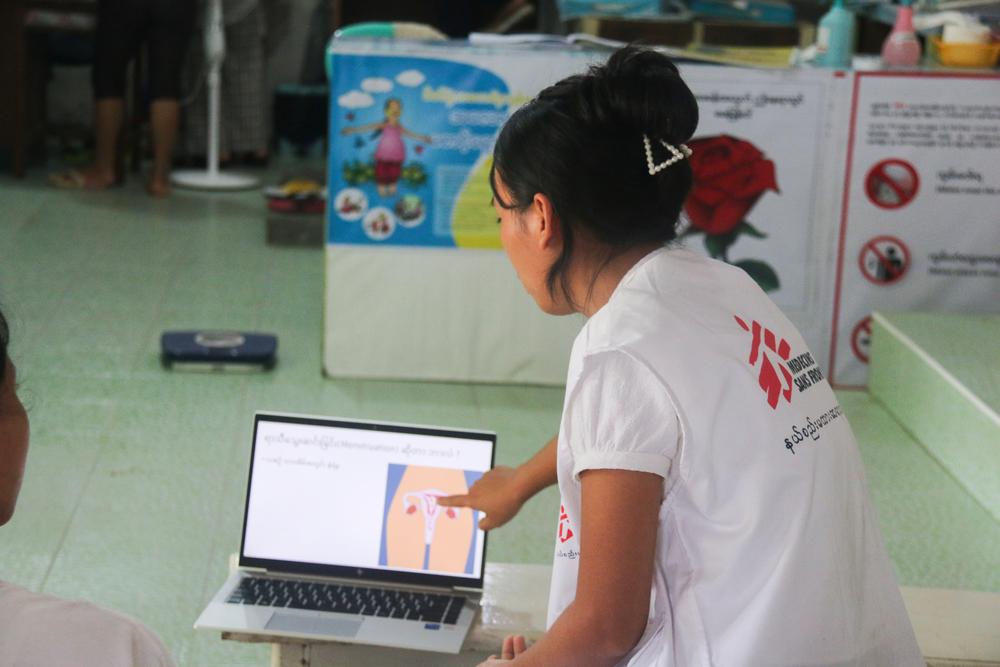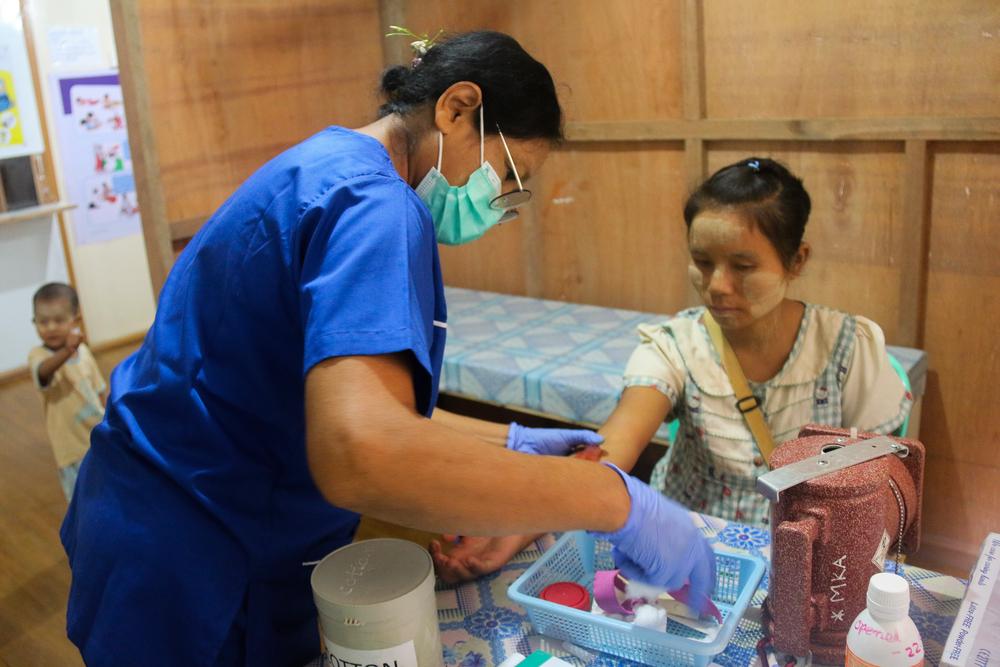Myanmar: Raising awareness on sexual violence and healthcare access through digital health promotion

Doctors Without Borders Health Promotion Supervisor delivers sexual and reproductive health education lessons to patients at a new sexual reproductive healthcare clinic in the Bhamo area of Kachin state. Myanmar, August 2023. © Zar Pann Phyu/MSF
Doctors Without Borders / Médecins Sans Frontières (MSF) in Myanmar are using digital tools to raise awareness on sexual and intimate partner violence and connect patients to healthcare providers when access to patients is impacted by conflict.
Armed conflict disproportionately affects women and girls, including putting them at higher risk of sexual and gender-based violence. Women and girls who are forcibly displaced are also more likely to experience intimate partner violence. Both are a reality for women and girls in Myanmar, which has recently been ranked 165 out of 177 on the women’s global health and security index.
Recent escalation of conflict in Myanmar has led to a new wave of internally displaced people, adding over 200,000 to the already large numbers, and cutting off many women from essential services and information about sexual health, sexual and intimate partner violence, gender-based violence and pregnancy. Local journalists recently reported that a pregnant woman in Rakhine died before she could make it to hospital after being held at a military checkpoint.
The International Day for the Elimination of Violence against Women on 25 November marks the start of 16 days of activism against gender-based violence, a UN and civil society campaign designed to raise awareness and galvanise efforts to end violence against women and girls around the world. During the campaign, Doctors Without Borders Myanmar will be raising awareness about its new digital health promotion campaign designed to raise awareness on the health consequences of sexual and intimate partner violence, and to help survivors of such violence access Doctors Without Borders clinics that provide medical care and link to psychosocial services.
Increasing awareness online
As well as preventing patients from accessing healthcare, the conflict makes it difficult for Doctors Without Borders staff to reach the most vulnerable patients and deliver care in the community. Even health workers who live and work in communities don’t always manage to reach people in the furthest corners of our project areas, where there is little awareness that sexual and intimate partner violence has severe health consequences, and care for these issues is available with Doctors Without Borders.
One of our sexual and intimate partner violence nurses in Shan, May Phyu* said: “The patients have very limited knowledge about [SV-IPV]. There are some people who are abused daily but they do not realize that they are abused. There are just a handful of patients who come to the clinic by themselves, as they know they need the medical attention after encountering such violence.”
This sentiment was echoed by Doctors Without Borders sexual violence response programme supervisor in Rakhine who noted that there is a belief, particularly with intimate partner violence, that it is “normal”.
To encourage patients to seek physical and psychosocial help for sexual and intimate partner violence, our teams first need to talk about what it is and improve the community’s understanding of the health consequences, the treatment available and how to reach Doctors Without Borders services.
Speaking of health education [HE], we distribute pamphlets, and for some people who cannot read, we organize HE sessions in the community. However, I think there is less prevalence on social media. Nowadays, everyone is using mobile phones, and it would be perfect if we also could share health educations about (SV-IPV) via social media.May Phyu*, nurse
Internet usage in Myanmar has certainly sky-rocketed in the last ten years, growing from 908k users to 23.9 million, with 15 million active social media users, mostly on Facebook.
What’s more, despite ranking poorly overall in the latest ‘Women, Peace and Security’ index, women’s cell phone use in Myanmar has increased from 67.3% in 2017 to 90% which is far higher than some neighbouring countries such as Laos, Cambodia and Bangladesh at 81%, 79% and 75% respectively.
Doctors Without Borders is harnessing these trends by using Facebook to spread health education and awareness about women’s reproductive health and sexual and intimate partner violence. Doctors Without Borders Myanmar’s campaign will also increase awareness of Doctors Without Borders services and enable people to find their nearest clinic, with the aim of reaching people in active conflict zones.
In time, the project will use messaging tools to connect patients directly to a healthcare provider online.

A patient attends the new clinic in Bhamo, Kachin state to receive antenatal care throughout her second pregnancy. Myanmar, August 2023. © Zar Pann Phyu/MSF
A community-based approach
While Facebook and Doctors Without Borders’s online health education services are available widely, we still have a long way to go in increasing the accessibility of care in a country where movement is heavily restricted and dangerous. Dr Noor Rijnberg, a sexual reproductive health implementer, describes the ambitions of the SV-IPV team in Myanmar as “to bring care closer to the people and in that way ensure care to women and girls who otherwise don’t have access but also to adapt programs to fit how the community can best receive care.”
At all its clinic sites in Myanmar, Doctors Without Borders runs services for sexual reproductive health and survivors of sexual and intimate partner violence. In the town of Bhamo, we have recently opened a new clinic, specifically for sexual and reproductive health and sexual violence and intimate partner violence, to address high levels of unmet needs, particularly among people who have been displaced in the area.
Sustainable investments like these are more important than ever to address sexual and intimate partner violence amid the ongoing impacts of multiple crises in Myanmar.